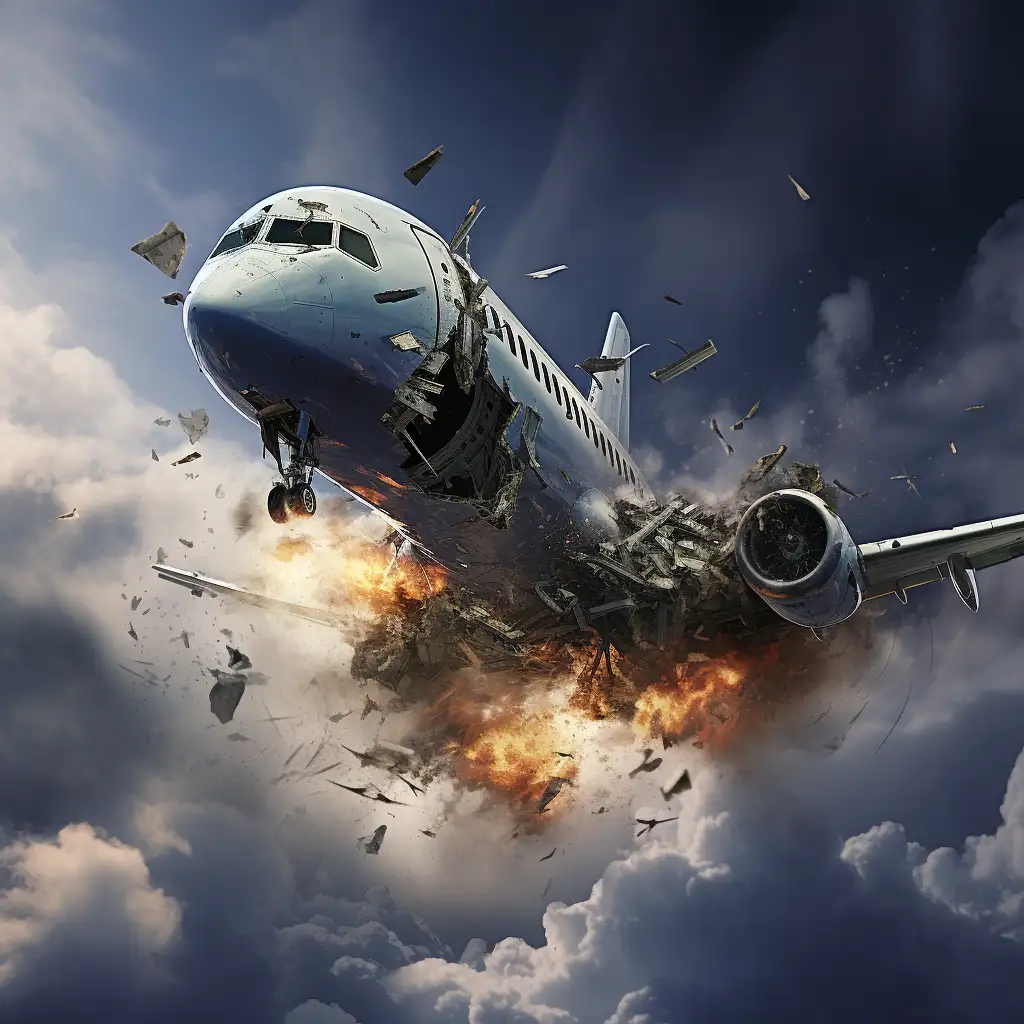Key Takeaways
2. Modern psychological theories view dreams as a window into our unconscious mind, with symbols playing a crucial role in dream communication.
3. Plane crash dreams are not uncommon and are deeply personalized, influenced by individual experiences, beliefs, and emotions.
4. The symbolism of airplanes in dreams represents our journey through life, while a plane crash often symbolizes disruptions or turbulence in this life journey.
5. Emotions within the dream are essential for interpretation, as feelings of calm or fear can reveal insights into personal growth or unresolved anxieties.
6. Dreams are influenced by both personal experiences and broader societal factors, making them a reflection of both individual and collective concerns.
7. Plane crashes as a collective dream symbol represent widespread fear and anxiety about loss of control and vulnerability.
8. Dream narratives differ based on the dreamer’s role in the dream, such as being a passenger, pilot, or observer, providing unique insights into underlying themes.
9. Dream interpretation requires personal reflection and understanding of the emotional connections to waking life, but seeking professional help may be beneficial in certain situations.
Dreams, aren’t they intriguing? They have a mystifying way of merging reality with fantasy, often leaving us to ponder their significance. In this article, we’ll journey into a unique aspect of the dream realm – plane crash dreams. Intrigued? Let’s get started.
The Landscape of Dreams
Since antiquity, humans have been captivated by the enigmatic world of dreams. Various cultures and societies have perceived them differently, attributing them with mystical and prophetic properties, or viewing them as intimate messages from the divine. More recently, with the rise of psychology and neuroscience, we have come to understand dreams as an integral part of our cognitive processes – a way for our brains to digest, interpret and archive the events of our waking lives.
The Role of Dreams in History and Culture
In ancient Egypt, dreams were considered messages from the gods, with specific dream interpreters employed in royal courts. The Greeks saw dreams as predictions of the future and created temples where the sick could find healing through their dreams. Indigenous cultures, like the Native Americans, view dreams as spiritual journeys, an essential part of their cultural and religious life. These historical perspectives illustrate the deep human curiosity about dreams and their meanings.
The Psychological Perspective
Modern psychological theories, notably those proposed by Sigmund Freud and Carl Jung, approach dreams as a window into our unconscious mind. Freud believed dreams were the expression of repressed desires, while Jung proposed they are a tool for the psyche to communicate with our conscious mind, offering insights into personal growth and wholeness.
Dreams and Symbolism
Regardless of the differing views, one common thread weaving through these interpretations is symbolism. Dreams converse not in our day-to-day language, but through a rich tapestry of symbols. These symbols, whether they are objects, people, or situations, are not always literal representations. A drowning dream, for instance, does not necessarily predict a watery peril, but might symbolize feeling overwhelmed in your waking life.
This symbolic language of dreams is profoundly personalized. The meanings of dream symbols can differ vastly among individuals based on their experiences, beliefs, and emotions. For example, a dog in a dream might signify loyalty and companionship to a dog lover, while it could evoke fear and anxiety in someone who’s had a traumatic experience with a dog.

Plane Crashes in Dreams: An Overview
Experiencing a plane crash in your dream can be a daunting, even chilling experience. Yet, you may find some solace in knowing that such dreams, despite their dramatic imagery, are not uncommon. The question then arises – what exactly do these dreams signify?
The Personalized Nature of Dreams
Before delving into specifics, it’s crucial to understand that dreams are as unique as the individuals who dream them. Several factors influence the content and interpretation of our dreams. Your personal feelings towards flying, any recent or memorable plane journeys, a movie involving a plane crash you might have watched recently, or even news about aviation accidents can all be potential contributors to such a dream.
Airplanes as Symbols in Dreams
In the symbolic language of dreams, airplanes generally stand for our journey through life. Just as a plane navigates through the vast sky, we navigate through the expanse of our lives. The plane’s course, its condition, and your role in the dream can all add layers to the interpretation.
Interpreting Plane Crashes in Dreams
When it comes to a plane crash in a dream, it often symbolizes a disruption or turbulence in this life journey. This could relate to any area of your life – personal, professional, or emotional. A plane crash might signify a sudden, unforeseen change or a drastic event that is causing you distress.
Keep in mind that a dream plane crash doesn’t forecast a real-life disaster. Instead, it mirrors your inner state, reflecting anxieties, fears, or potential disruptions that you perceive in your waking life.
Individual Variations
Lastly, it’s essential to remember that the same dream can have different meanings for different people. A dream about a plane crash might stir up feelings of fear in one person, while in another, it might evoke a sense of liberation or transformation. The context of your personal life, your emotions during the dream, and your feelings upon waking, all contribute to shaping the dream’s unique meaning for you.
Common Interpretations of Dreaming About Plane Crashes
Dreaming about plane crashes can bring a wave of emotions, but don’t be quick to label it as a nightmare. These dreams, as intense as they may seem, can provide significant insight into your feelings, fears, and anxieties. Several interpretations are commonly associated with plane crash dreams.
Fear of Losing Control
Airplanes in dreams often symbolize our life path, and a crashing plane can represent a fear of losing control. This could be in any aspect of your life – your career, personal relationships, or even health. This type of dream may surface when you’re navigating through a period of uncertainty or change, and feel that things are not within your grasp.
Anxiety about Significant Life Events
Plane crashes are dramatic, sudden events. In dreams, they could signify your anxiety about significant upcoming life events. Are you planning a wedding, starting a new job, or moving to a new city? Big changes, even positive ones, bring a sense of uncertainty. A plane crash dream could be your subconscious expressing anxieties related to these changes.
Fear of Failure
If you’ve ever watched a plane descending rapidly, you know it’s hard to not equate it with failure. In dream language, a crashing plane can often symbolize a fear of failure or setback. If you’re feeling pressured to succeed or worried about meeting high expectations (from yourself or others), these fears could manifest as a plane crash in your dream.
Personal Context and Interpretation
While the interpretations mentioned above are common, the one that resonates with you could be entirely different. Context is king when it comes to dream interpretation. The same plane crash dream could represent a fear of public speaking if it occurs before a big presentation, while it might indicate travel anxiety if you’re about to embark on a journey.
How Emotion Shapes Interpretation
Dreams are not only composed of images and narratives but are also deeply infused with emotions. These emotions – whether they are fear, joy, sadness, or anger – play a pivotal role in how we interpret our dreams. Two dreams with identical plots can have entirely different meanings, influenced by the emotional state experienced within the dream.
The Role of Emotions in Dreams
Emotions in dreams function as a powerful lens, adding depth and color to the narrative. They often serve as indicators of our psychological state and our subconscious feelings towards the events happening in our waking life. Paying close attention to these emotions can provide important clues about what a dream might signify.
Interpretation Based on Emotional State
When it comes to dreams about plane crashes, your emotional reaction within the dream is key to understanding its meaning. Let’s consider two scenarios:
- Feeling Calm Post-Crash: Paradoxically, if you find yourself feeling calm or even relieved after a plane crash in your dream, it might symbolize overcoming obstacles or facing your fears. The crash, in this context, could represent a situation or problem that you have recently dealt with successfully. This sense of calm might be indicative of your resilience and capacity to handle crises.
- Feeling Terrified Post-Crash: On the other hand, if the crash leaves you feeling terrified, anxious, or overwhelmed, it could indicate unresolved fears or anxieties. This could be a sign that there is a situation or issue in your waking life that you find daunting or are struggling to handle. Your subconscious mind could be urging you to address these fears.
Remember the Individual Differences
As we navigate through the dream world, it’s vital to remember that the same emotion can symbolize different things to different people. Emotions are deeply personal, and their interpretations are influenced by our individual experiences, beliefs, and psychological make-up. Always take into account your personal context when trying to understand the emotional aspect of your dreams.

Influence of Personal and Societal Experiences
Dreams are not isolated phenomena; they are intricately woven into the tapestry of our personal and societal experiences. From our individual encounters to the collective consciousness of our society, various external factors seep into our dream world, coloring and shaping the narratives we experience in our sleep.
The Impact of Personal Experiences
Our personal experiences, especially those that leave a strong emotional imprint, often find their way into our dreams. For instance, if you’ve recently had a turbulent flight or a scary experience related to flying, that could potentially trigger a dream about a plane crash.
This is because our brains process and make sense of our experiences during sleep. A frightening flight experience could be your brain’s way of processing the fear and anxiety associated with that event.
The Role of Societal Factors
Beyond our personal sphere, broader societal factors can also influence our dreams. High-profile events, particularly those that evoke strong emotions, can seep into our collective consciousness and find representation in our dreams.
For instance, if there’s a high-profile plane crash that has been extensively covered in the media, it could influence your dream content, leading to dreams about plane crashes. This is a manifestation of societal fear and anxiety being processed at an individual level.
The Intersection of Personal and Collective Experiences
Interestingly, the line between personal and collective experiences often blurs in the realm of dreams. A societal event like a plane crash could stir personal fears and anxieties about flying. Similarly, a personal experience with a turbulent flight might echo societal fears around air travel safety.
These personal and societal experiences, in essence, feed into each other, creating a dynamic interplay that shapes our dream world. Recognizing this interplay can be incredibly helpful in understanding the context of our dreams, including those about plane crashes.
Plane Crashes as a Collective Dream Symbol
While dreams are deeply personal phenomena, they also draw from a well of collective symbols and archetypes. These symbols often serve as a shared language that cuts across cultural and geographical boundaries. Among these symbols, plane crashes have emerged as a potent representation of widespread fear and anxiety.
Plane Crashes: A Symbol of Fear and Anxiety
Airplanes are marvels of human technology, symbolic of progress, freedom, and the ability to transcend boundaries. Conversely, a plane crash, with its connotations of disaster, loss, and uncontrollable circumstances, has become a powerful symbol of collective fear and anxiety.
Plane Crashes and Societal Concerns
Plane crash dreams can encapsulate broad societal concerns. They might mirror collective anxieties around technological failures, human error, or the vulnerability inherent in our increasingly global and interconnected world. In an era where air travel is commonplace, the fear of plane crashes is shared widely, making it a potent collective dream symbol.
The Intersection of Personal and Collective Fears
Plane crash dreams also demonstrate the intriguing intersection of personal and societal fears. Your dream of a plane crash might be influenced by both your personal anxieties about flying and the societal fear of air disasters. This underlines how our dream landscapes are shaped not just by our personal experiences and emotions, but also by the wider societal context in which we live.
The Significance of Collective Dream Symbols
Understanding plane crashes as a collective dream symbol can add another layer of meaning to your dream interpretations. It encourages us to consider our dreams as not merely individual narratives, but also as part of a broader, collective human experience.
The Spectrum of Dream Plane Crashes
Dreams about plane crashes can take various forms, and each one presents a different narrative with unique implications. An intriguing factor that can dramatically influence the interpretation of your dream is your role in it. Who are you in your dream? Are you a passenger, a pilot, or an observer on the ground? The answer to this question can offer valuable insights into the underlying themes and messages of your dream.
The Pilot’s Seat: Control and Responsibility
If you dream of being the pilot in a plane crash, it might symbolize a sense of control or, more importantly, the fear of losing it. As a pilot, you’re at the helm, steering the course of the journey.
- In Control: If you manage to control the situation and prevent the crash, it might suggest that you’re successfully navigating through some challenging situation or complicated issue in your waking life.
- Fear of Losing Control: However, if you fail to prevent the crash, it could imply fear of failure or losing control over some aspects of your life. This might be an indication that you’re feeling overwhelmed or apprehensive about some responsibility that you’re currently shouldering.
The Passenger’s Perspective: Being Guided by Others
If you’re a passenger during a plane crash in your dream, it could indicate feelings of passivity or lack of control. As a passenger, you’re relying on others (the pilots) to guide the journey.
- Feeling Out of Control: This could symbolize a situation in your life where you feel something is out of your hands, or you’re being controlled by external circumstances or individuals. This dream might be an invitation to regain control or assert yourself in this situation.
- Trust and Relinquishment: Alternatively, being a passenger could also represent trust and the acceptance of guidance from others. This can be a reminder of the importance of collaboration and trust in others, especially during times of crisis.
The Observer’s View: Detachment and Objectivity
Perhaps you’re an observer on the ground, watching the plane crash from a distance. This perspective can offer a different set of interpretations.
- Detachment: This could indicate that you’re feeling detached or disconnected from a situation or a relationship in your life. It could suggest the need to be more engaged and active.
- Objectivity: On the other hand, being an observer might also represent your ability to view a situation objectively, from a distance. This could mean you’re well-positioned to make rational decisions about a complicated situation in your life.

Interpreting Other Dream Symbols
Dreams, especially those as vivid as plane crashes, are often filled with a plethora of symbols, each adding a layer of depth to your dream’s interpretation. Whether it’s fire, water, or familiar faces, these elements can bring new dimensions of understanding to your dream narrative.
Fire: Destruction or Transformation
Fire in dreams often has a dual interpretation. On one hand, it can signify destruction and fear, especially if it is a part of the plane crash scenario.
- Destruction and Fear: A fiery plane crash might represent a situation or relationship in your waking life that is spiraling out of control, causing fear or stress. However, fire is also a symbol of transformation, change, and purification.
- Transformation and Purification: In this context, the fiery crash could symbolize an intense transformational process you are going through, or it could represent a desire to purge some negativity from your life.
Water: Emotion and the Subconscious
Water is a common symbol in dreams and can represent a range of emotions and subconscious thoughts. If your plane crash dream involves water—say, the plane crashes into the sea—this could hold significant meaning.
- Emotions: Water often symbolizes emotions in dreams. A plane crash into the sea could represent a tumultuous emotional state or suppressed feelings that need to be acknowledged.
- Subconscious Thoughts: Water can also represent the realm of the subconscious. A crash into water might suggest that there’s a deep-seated issue or fear that you need to dive into and confront.
Familiar Faces: Relationships and Aspects of Self
Recognizing familiar faces in your dream can provide significant insights into the dream’s meaning.
- Relationships: Known faces might be linked to relationships in your life. If someone you know is with you in the plane crash, it could indicate that your relationship with that person is going through a stressful period, or it could suggest that the person represents a certain quality or situation you’re dealing with.
- Aspects of Self: Familiar faces can also represent different aspects of your own self. The people in your dream might symbolize qualities that you share with them, suggesting an internal conflict or an aspect of your personality that you need to confront.
The Importance of Personal Reflection
Dream interpretation is a deeply introspective journey. Like piecing together a puzzle, you are fitting together various elements of your dream to form a coherent narrative that reflects your internal emotional landscape. To truly understand your dreams, you need to engage in self-reflection and explore the connections between your dream world and your waking life.
Exploring the Dream Narrative
Start by revisiting the events of the dream. What exactly was happening in the dream? What details stand out? Try to recall as much as possible and write it down.
- Detail-Oriented Recall: Your dream about a plane crash isn’t just about the crash itself. It’s about the buildup, the aftermath, the people, the emotions, and every small detail in between. These details might hold the key to understanding the larger narrative your subconscious is trying to communicate.
Emotion Mapping
Reflect on how the dream made you feel. Did you wake up terrified, relieved, confused? How did you feel during the dream? Emotions play a pivotal role in dream interpretation.
- Unpacking Emotions: Your emotional response in the dream and upon waking provides valuable insight into what the dream might be reflecting about your current emotional state or circumstances.
Connecting to Your Waking Life
Now comes the crucial step: Connecting your dream to your waking life. Are there any parallels between the dream and what’s happening in your life right now? Are you dealing with stress, anticipation, fear, change, or any other strong emotion?
- Looking for Parallels: The connection might not be obvious or direct. For instance, a dream about a plane crash doesn’t necessarily mean you’re anxious about a plane journey. It could symbolize any situation in your life where you’re feeling a loss of control, fear of failure, or significant change.
When to Seek Professional Help
Dreams are a natural part of our mental landscape. They can be mysterious, intriguing, and sometimes unsettling, but they’re a normal part of human psychology. However, there might be times when your dreams cause significant distress or impact your daily life negatively. In such situations, it’s crucial to recognize that it’s okay – and often beneficial – to seek professional help.
Signs You Might Need Professional Help
Several signs indicate that it might be time to reach out to a professional for help with your dreams:
- Persistent Distress: If you find that your dreams, such as recurring plane crash dreams, are causing ongoing distress or anxiety, this could be a sign to seek help.
- Sleep Disruption: Dreams that frequently wake you up, disrupt your sleep, or lead to insomnia might indicate that it’s time to consult a professional.
- Daily Life Impact: When dreams start to negatively affect your day-to-day life, your work, your relationships, or your general wellbeing, professional guidance can be very helpful.
How Professionals Can Help
Professionals, like therapists or counselors, can provide valuable insights into your dreams and help you navigate your dream landscape more effectively.
- Dream Analysis: Many professionals are trained in dream analysis and can help you understand the symbols and narratives in your dreams in the context of your life and psychological state.
- Coping Mechanisms: Professionals can provide strategies and techniques to manage any distress caused by your dreams, helping you cope better with any anxiety or fear they may be causing.
- Deeper Exploration: Therapists can help you delve deeper into the issues that your dreams might be hinting at. They can guide you to explore your subconscious fears, anxieties, and desires, and help you address them constructively.
Conclusion
Dreams are a mirror to our subconscious. Even the most unnerving ones, like plane crashes, can provide profound insights into our lives. So the next time you find yourself in a mid-air calamity while in dreamland, don’t be alarmed. Instead, see it as an opportunity for self-discovery and personal growth. You’re the master of your dream world, after all.
And remember, while dreams can seem perplexing and sometimes frightening, they are a natural part of our human experience, providing us with the opportunity to learn more about ourselves.
FAQs
A: Dreams are a natural part of the human subconscious and can be influenced by various factors like stress, anxiety, and life experiences. Dreams about plane crashes may symbolize underlying fears, a sense of lack of control, or a need for change in certain aspects of your life.
Q: Do plane crash dreams predict actual disasters?
A: No, dreams about plane crashes are not premonitions of real events. They are a product of your imagination and emotions, not a glimpse into the future. These dreams should not be taken as a warning of an impending disaster.
Q: Are there common triggers for plane crash dreams?
A: Yes, several factors can trigger such dreams, including fear of flying, travel-related stress, recent exposure to news or media about plane accidents, personal anxieties, or life transitions that feel overwhelming.
Q: What emotions are often associated with these dreams?
A: People who experience dreams about plane crashes often report feelings of fear, panic, helplessness, and vulnerability. These emotions may reflect broader concerns or insecurities in waking life.
Q: Is there a way to prevent these dreams from occurring?
A: While you cannot completely control your dreams, you may reduce the likelihood of having plane crash dreams by managing stress, addressing anxieties related to flying or travel, and maintaining a healthy sleep routine.
Q: Should I be worried if I never dream about plane crashes?
A: No, it is perfectly normal not to dream about plane crashes or experience specific themes in your dreams. Dream content varies widely among individuals and may change over time.




